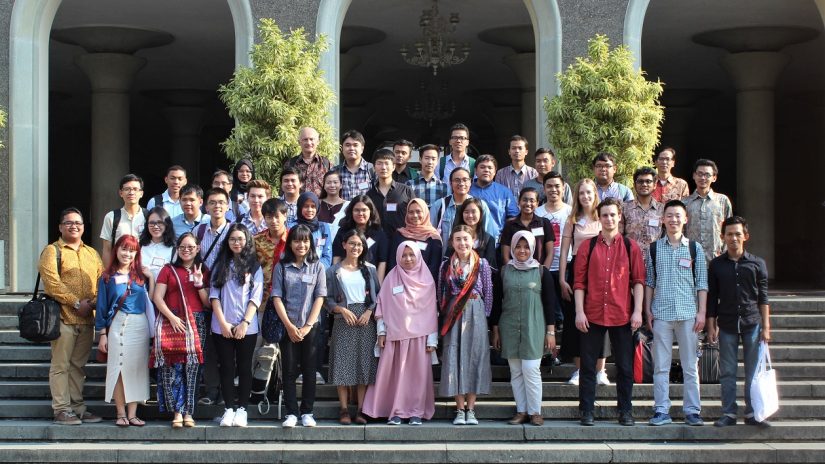
As citizens of modern Southeast Asia, we often take for granted nation-state that in fact is a new concept. Not only it is contemporary, border that demarcate states both on water and land is innately artificial and porous. Department of History, Faculty of Cultural Sciences UGM initiated “International Summer School on Southeast Asian Studies; Transnational History: Becoming a Cosmopolitan Historian” to promote perspective that transcends border for young and potential researchers. The summer school took place at Faculty of Cultural Sciences Universitas Gadjah Mada from 27th August– 6th September 2018. Participants of this summer school are undergraduate and graduate students as well as young lecturers from Australia, Japan, Malaysia, Thailand, United States, and Vietnam. This summer school also incorporates Indonesian students from state universities throughout the country.
The summer school involved students in 17 classroom sessions that raises subtopics namely: introduction to transnational perspective, religion, diaspora, disease, city as the stage of transnationalism, transnationalism and human security issues, as well as relation between transnationalism with national historiography. Each session taught by lecturers that are expert on the field; Prof. Dr. Vincent Houben (Universitat Berlin), Prof. Kate McGregor (University of Melbourne), Prof. Dr. Atsushi Ota (Keio University), Prof. Danny Wong Tze Ken (University of Malaya), Prof. Dr. Jurgen Sarnowsky (University of Hamburg), Dr. Pham Van Thuy (Vietnam National University-Hanoi), Dr. Adisorn Muakpimai (Thammasat University), Dr. Onanong Thippimol (Thammasat University), Dr. Shiskha Prabawaningtyas (Universitas Paramadina), Dr. Francis Gealogo (Ateneo de Manila University), Dr. Riza Noer Arfani (Department of International Relation UGM), Dr. Nina Mariani Noor (Universitas Islam Negeri Sunan Kalijaga Yogyakarta), and Mr. Ariel Lopez, MA (University of the Philippines Diliman). Faculty members from the Department of History UGM; Prof. Bambang Purwanto, Dr. Sri Margana, and Dr. Farabi Fakih also contributed on teaching process of the summer school. Participants also obtained valuable opportunity to listen a presentation brought by Mr.Wahyu Susilo, activist of Migrant Care, organization that deals with migrant worker issues.
Apart from interactive classroom sessions, participants of the summer school also went for temple trip and bicycle city tour to observe closely tangible heritage that has transnational characteristics in Yogyakarta. During two days trip, participants accompanied by organizers and student buddies visited Plaosan Temple, Sambisari Temple, Tjen Ling Kiong Chinese Temple (Klenteng Poncowinatan), and Santo Yusup Catholic Church at Bintaran among others.
Participants of the summer school were also required to do group project about transnational history. For this matter, participants went for field research to collect primary data regarding their project. Representatives of group presented their result in the last day of the summer school as a follow up of their field research. Themes chosen by participants of the summer school were not only thought-provoking but also incited rigorous discussion in the class. Group 1 chose jamu as core topic of their paper although interestingly explained it through friction between traditional medicine vs western medicine, Group 2 raised “sensitive” issue on Papuan student and their survival strategy in Yogyakarta, Group 3 investigated transnationality of Ramayana and proven that Ramayana is a shared among Southeast Asian citizens, Group 4 discussed street food and its encounter with global obsession, Group 5 researched on bakpia as a product of cultural interaction between Chinese diaspora with indigenous community, whereas Group 6 paid close attention to batik and its transnational characteristic that is manifested on their pattern and coloring among others.
Dr. Sri Margana, Head of History Department as well as Chief Organizer of the Summer School, emphasized that UGM and partnering universities committed to continue the summer school in upcoming years. “We would raise the same issue; transnational history but certainly with more professors, richer themes, and more diverse participants” stated Dr. Sri Margana in front of participants on the closing remarks. [Sej/Ody]
